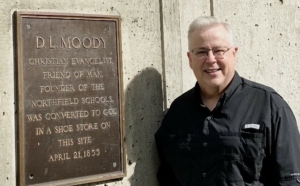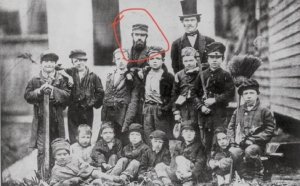Visit to D. L. Moody Museum
Rev. Tony Cooke
When D. L. Moody was just four years old, his father died and left the family — his widow and nine children — under great financial pressure. Creditors took all their possessions, even their firewood. He experienced massive challenges growing up, only finished the fifth grade, and left home at the age of seventeen.
He ended up working in his uncle’s shoe store in Boston, and was hired on the condition that he regularly attend church and Sunday School. When Dwight tried to read the Bible out loud, his uncle said it was almost impossible to understand what he said. He skipped entire words because he did not know what they were or how to pronounce them.
On one occasion, his Sunday School teacher, Mr. Edward Kimball, handed Dwight a Bible and instructed all of the class to turn to John’s Gospel. He saw Dwight open the Bible to Genesis and begin slowly thumbing through it. Not wanting Dwight to be embarrassed in front of the others, he gave him his own Bible which was already open to the right place.
Mr. Kimball did far more than teach his class on Sundays; he cared deeply for the young men and made personal visits to check on their well-being. He was a bit nervous, though, when he resolved to visit young Dwight. He hesitated on whether to go or not, but pushed through and found Dwight in the back of the store. Mr. Kimball related:
“I went up to him and put my hand on his shoulder… then I made my plea, I feel it was really a very weak one. I simply told him of Christ’s love for him and the love Christ wanted in return. That was all there was of it. It seemed that the young man was just ready for the light that then broke upon him, for there at once in the back of that shoe store in Boston, the future great evangelist gave himself and his life to Christ.”

Did you notice what this dear man said? He said he felt his appeal to Mood “was really a very weak one.” In sharing with others, we sometimes focus on ourselves — we can be self-conscious. However, we are just one part of the equation. In every such situation, we have a part to play, God has a part to play, and the person we are interacting with has a part to play.
Never think that your presentation will not produce results because it is not “powerful enough.” After all, is your confidence in yourself or in God’s word? Is your confidence in your performance, or in the power of the Holy Spirit to transform lives? Paul said, “For I am not ashamed of the gospel of Christ, for it is the power of God to salvation for everyone who believes, for the Jew first and also for the Greek” (Romans 1:16 NKJV).
In another place, Paul wrote the Corinthians saying, “And my message and my preaching were very plain. Rather than using clever and persuasive speeches, I relied only on the power of the Holy Spirit. I did this so you would trust not in human wisdom but in the power of God” (1 Corinthians 2:4-5). It’s good when we communicate as clearly and effectively as possible, but always remember that it’s the power of God’s word and the power of the Holy Spirit that ultimately makes the difference.
Moody’s Reflections
Here is what Moody himself later recalled about the time Mr. Kimball visited him:
“When I was in Boston, I used to attend a Sunday School class, and one day… my teacher came around behind the counter of the shop I was at work in, and put his hand on my shoulder, and talked to me about Christ and my soul. I had not felt I had a soul till then. I thought, ‘This is a very strange thing. He is a man who never saw me till lately, and he is weeping over my sins, and I had never shed a tear about them.’ But I understand it now, and what it is to have a passion for men’s souls and weep over their sins. I don’t remember what the man said, but I can feel the power of that man’s hand on my shoulder tonight.”
Moody also spoke of the change that took place in his heart:
“I remember the morning on which I came out of my room after I had first trusted Christ. I thought the old sun shone a good deal brighter than it ever had before — I thought that it was just smiling upon me; and as I walked out upon Boston Common and heard the birds singing in the trees I thought they were all singing a song to me. Do you know, I fell in love with the birds. I had never cared for them before. It seemed to me that I was in love with all creation. I had not a bitter feeling against any man, and I was ready to take all men to my heart.”
A short time later, when Moody was examined as a candidate for church membership, he was disapproved because the committee believed he lacked sufficient knowledge of the Bible to be admitted. However, kindly mentoring was provided to Dwight, and he grew spiritually, albeit slowly. He was admitted into church membership a year later.
While we rejoice at the final result, Moody did not, at first, appear to be a great candidate for salvation or for future ministry. Edward Kimball, his Sunday School teacher said:
“I have seen few persons whose minds were spiritually darker than was his when he came into my Sunday School class; and I think that the committee of the Mount Vernon Church seldom met an applicant for membership more unlikely ever to become a Christian of clear and decided views of Gospel truth, still less to fill any extended sphere of public usefulness.”
Moody always felt out of place at this church, knowing that others there were more educated and socially refined than he was. Because of his zeal, he tended to be too outspoken for the people there. One biographer wrote, “The pastor and deacons were apparently unable to help Moody find constructive ways to use his energy. Instead, they urged him to be quiet in meetings and generally tried to bridle his enthusiasm.”
In spite of Moody’s rough beginnings, What God eventually did with and through Moody is nothing short of a miraculous work of grace.
Ministering to the Least of These
Moody would eventually be known for massive evangelistic meetings both stateside and abroad, but his early years of ministry focused on reaching children for Christ. In his early Chicago years, Moody (circled in the picture below) ministered in one of the city’s worst areas to impoverished and underprivileged children — the slum was nicknamed “Little Hell.”
A plaque in the Moody Museum in Chicago reads that “Moody rode his ‘missionary pony’ through town, passing out ‘missionary sugar’ — pennies and maple sugar candy… he appealed to the poorest of the poor.” By 1859, he had 1,500 students in his program. Shortly after the election of 1860, President-elect Abraham Lincoln even visited one of Moody’s classes when he passed through Chicago.

Moody’s Handling of Criticism
Moody was often criticized. In one case a lady informed him that she did not like his way of doing evangelism. He asked her how she won people to Jesus. She said that she didn’t. Moody told her, “I like my way of doing it better than your way of not doing it.”
In another situation, a person told Moody that he made numerous mistakes in grammar from the pulpit. He responded, “I know I make mistakes, and I lack many things, but I’m doing the best I can with what I’ve got.” He then commended the person for their grammatical skill and asked, “What are you doing with it for the Master?”
Helping Others From His Own Challenges
Moody possessed only a fifth-grade education, and yet he founded five different educational institutions. At the inauguration of the Northfield Seminary for Young Ladies in 1879, Moody said:
“My lack of education has always been a great disadvantage to me. I shall suffer from it as long as I live. I hope after all of us who are here today are dead and gone, this school may live and be a blessing to the world and that missionaries may go out from here and preach the gospel to the heathen, and it may be recognized as a power in bringing souls to Christ.”
Quotes by D. L. Moody
“I would not give much for a man’s Christianity, if he is saved himself and is not willing to try and save others. It seems to me to be the basest ingratitude if we do not reach out the hand to others who are down in the same pit from which we were delivered.”
“We may easily be too big for God to use, but never too small.”
“If we are true Christians we should all be missionaries. Christ came down from Heaven on a mission, and if we have his Spirit in us, we will be missionaries too.”
“Our Gospel that we are preaching is a supernatural Gospel, and we have got to have supernatural power to preach it.”
“If the lost are to be reached by the Gospel of the Son of God, Christianity must be more aggressive than it has been in the past. We have been on the defensive long enough; the time has come for us to enter on a war of aggression.”
“Where one man reads the Bible, a hundred read you and me. That is what Paul meant when he said we were to be living epistles, known and read of all men… If we do not commend the Gospel to people by our holy walk and conversation, we shall not win them to Christ. Some little act of kindness will perhaps do more to influence them than any number of long sermons.”

